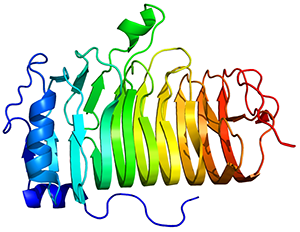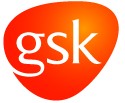Yesterday, in Biogen Idec, Inc. v. GlaxoSmithKline LLC, the Federal Circuit affirmed the determination by the District Court for the Southern District of California that the claim term "anti-CD20 antibody" as used in U.S. Patent No. 7,682,612 was limited by prosecution history estoppel. The '612 patent is directed to the treatment of hematologic malignancies associated with circulating tumor cells using anti-CD20 antibodies. Representative claim 1 recites:
1. A method of treating chronic lymphocytic leukemia in a human patient, comprising administering an anti-CD20 antibody to the patient in an amount effective to treat the chronic lymphocytic leukemia, wherein the method does not include treatment with a radiolabeled anti-CD20 antibody.
 As the majority opinion notes, it was initially believed that only one large loop (epitope) of the CD20 antigen (at right) was exposed on the surface of cancerous B cells, and therefore, that there was only one suitable target for the anti-CD20 antibody. However, after Biogen filed the application that issued as the '612 patent, other researchers discovered that the CD20 antigen had a second small loop to which certain anti-CD20 antibodies could bind.
As the majority opinion notes, it was initially believed that only one large loop (epitope) of the CD20 antigen (at right) was exposed on the surface of cancerous B cells, and therefore, that there was only one suitable target for the anti-CD20 antibody. However, after Biogen filed the application that issued as the '612 patent, other researchers discovered that the CD20 antigen had a second small loop to which certain anti-CD20 antibodies could bind.
During the prosecution of the application that issued as the '612 patent, the examiner rejected the claims because the specification did not provide enablement commensurate with the scope of the claimed invention, which the examiner contended included "any and all anti-CD20 antibodies, no matter the specificity or affinity for the specific epitope on the circulating tumor cells." The examiner acknowledged that the specification was enabling for Biogen's chimeric gamma 1 anti-human CD20 antibody, Rituxan® (rituximab), but was silent concerning the specificity and affinity that would be necessary for other anti-CD20 antibodies. In response to the rejection, Biogen stated that:
[E]ven though antibodies directed to the same antigen might have different affinities and functional characteristics, one of skill in the art could readily identify an antibody that binds to CD20 with similar affinity and specificity as does RITUXAN® using techniques that are well known in the art. . . . With that knowledge in hand, the skilled artisan could readily produce anti-CD20 antibodies using similar techniques, and screen such antibodies for those having an affinity and functional activity similar to RITUXAN®.
The examiner then withdrew the rejection and allowed the application.
 In March 2010, Biogen filed suit against GlaxoSmithKline, asserting that GSK's anti-CD20 antibody Arzerra® (ofatumumab) infringed claims 1-4, 6, 8-10, 14-17, 20-22, and 58-60 of the '612 patent. In contrast with Rituxan®, Arzerra® binds to the second small loop of the CD20 antigen, has a much greater affinity for the CD20 antigen, and is a fully human antibody. The District Court conducted a Markman hearing to construe three terms, including the term "anti-CD20 antibody." The District Court rejected Biogen's broad construction of "an antibody that binds to a cell surface CD20 antigen," and instead adopted GSK's construction "rituximab and antibodies that bind to the same epitope of the CD20 antigen with similar affinity and specificity as rituximab." In adopting the latter construction, the District Court noted that prosecution history disclaimer applied because Biogen had limited the term to overcome the examiner's enablement rejection. Following this construction, Biogen stipulated to noninfringement and appealed the District Court's construction to the Federal Circuit.
In March 2010, Biogen filed suit against GlaxoSmithKline, asserting that GSK's anti-CD20 antibody Arzerra® (ofatumumab) infringed claims 1-4, 6, 8-10, 14-17, 20-22, and 58-60 of the '612 patent. In contrast with Rituxan®, Arzerra® binds to the second small loop of the CD20 antigen, has a much greater affinity for the CD20 antigen, and is a fully human antibody. The District Court conducted a Markman hearing to construe three terms, including the term "anti-CD20 antibody." The District Court rejected Biogen's broad construction of "an antibody that binds to a cell surface CD20 antigen," and instead adopted GSK's construction "rituximab and antibodies that bind to the same epitope of the CD20 antigen with similar affinity and specificity as rituximab." In adopting the latter construction, the District Court noted that prosecution history disclaimer applied because Biogen had limited the term to overcome the examiner's enablement rejection. Following this construction, Biogen stipulated to noninfringement and appealed the District Court's construction to the Federal Circuit.
 Writing for the majority, Judge Reyna notes that because neither the claims nor the specification compelled a construction that was contrary to the one offered by Biogen, the question before the Court was whether statements in the prosecution history were sufficient to overcome the heavy presumption that the term "anti-CD20 antibody" carries its full ordinary and customary meaning. The majority concludes that Biogen's statements during prosecution were sufficient. In particular, the majority observes that:
Writing for the majority, Judge Reyna notes that because neither the claims nor the specification compelled a construction that was contrary to the one offered by Biogen, the question before the Court was whether statements in the prosecution history were sufficient to overcome the heavy presumption that the term "anti-CD20 antibody" carries its full ordinary and customary meaning. The majority concludes that Biogen's statements during prosecution were sufficient. In particular, the majority observes that:
[R]ather than challenging the examiner's understanding of the crucial terms, the applicants argued that the specification was enabling for anti-CD20 antibodies with similar affinity and specificity as Rituxan®. Indeed, the applicants conceded that other "antibodies directed to the same antigen [i.e., CD20] might have different affinities and functional characteristics," and limited their claims to antibodies similar to Rituxan® nonetheless. . . . [I]t is clear that they were limiting their invention to what the examiner believed they enabled: antibodies that have a similar specificity and affinity for the specific epitope to which Rituxan® binds.
The majority also found both of Biogen's arguments regarding why the plain and ordinary meaning of the term should control to be unpersuasive. First, in response to Biogen's argument of claim differentiation (that claim 1 broadly covers any and all anti-CD20 antibodies and several dependent claims are directed to specific types of antibodies, i.e., chimeric, rituximab, humanized, and human), the majority counters that "[o]ur cases make clear . . . that where found, prosecution history disclaimer can overcome the presumption of claim differentiation." In response to Biogen's second argument that the '612 patent incorporates U.S. Patent No. 5,736,137, and that the '137 patent's broader definition of "anti-CD20 antibody" should control, the majority states that "[t]he problem with this argument is that the '137 patent expressly and uniquely defines 'anti-CD20 antibody' for use therein, that is, within the '137 patent."
Writing in dissent, Judge Plager states that "[b]ecause I do not find anywhere in the majority opinion or in the prosecution history that clear and unmistakable evidence of a disclaimer as required by our precedents, I cannot agree with the majority that such a disclaimer was made by Biogen during the prosecution of its application for the '612 patent." Noting that "[t]he only dispute is whether the applicants disclaimed the plain meaning of 'anti-CD20 antibody' during prosecution," Judge Plager states that "[t]he majority purports to tease out of the prosecution history such a disclaimer." The dissent continues:
Nowhere in the prosecution history did the applicants state that antibodies that bind to the same epitope on CD20 with similar affinity and specificity as RITUXAN® must be used, or that antibodies lacking those characteristics must not be used. To the contrary, the applicants repeatedly made clear -- including in the same discussion as the allegedly disclaiming statement -- that because the invention was based on the discovery that anti-CD20 antibodies could treat CLL, the claimed methods were not limited to the use of any particular type anti-CD20 antibody.
"Because the district court's construction eviscerates the 'clear and unmistakable' requirement for prosecution disclaimer," Judge Plager states that he "cannot join the majority in affirming that erroneous construction."
Biogen Idec, Inc. v. GlaxoSmithKline LLC (Fed. Cir. 2013)
Panel: Circuit Judges Dyk, Plager, and Reyna
Opinion by Circuit Judge Reyna; dissenting opinion by Circuit Judge Plager